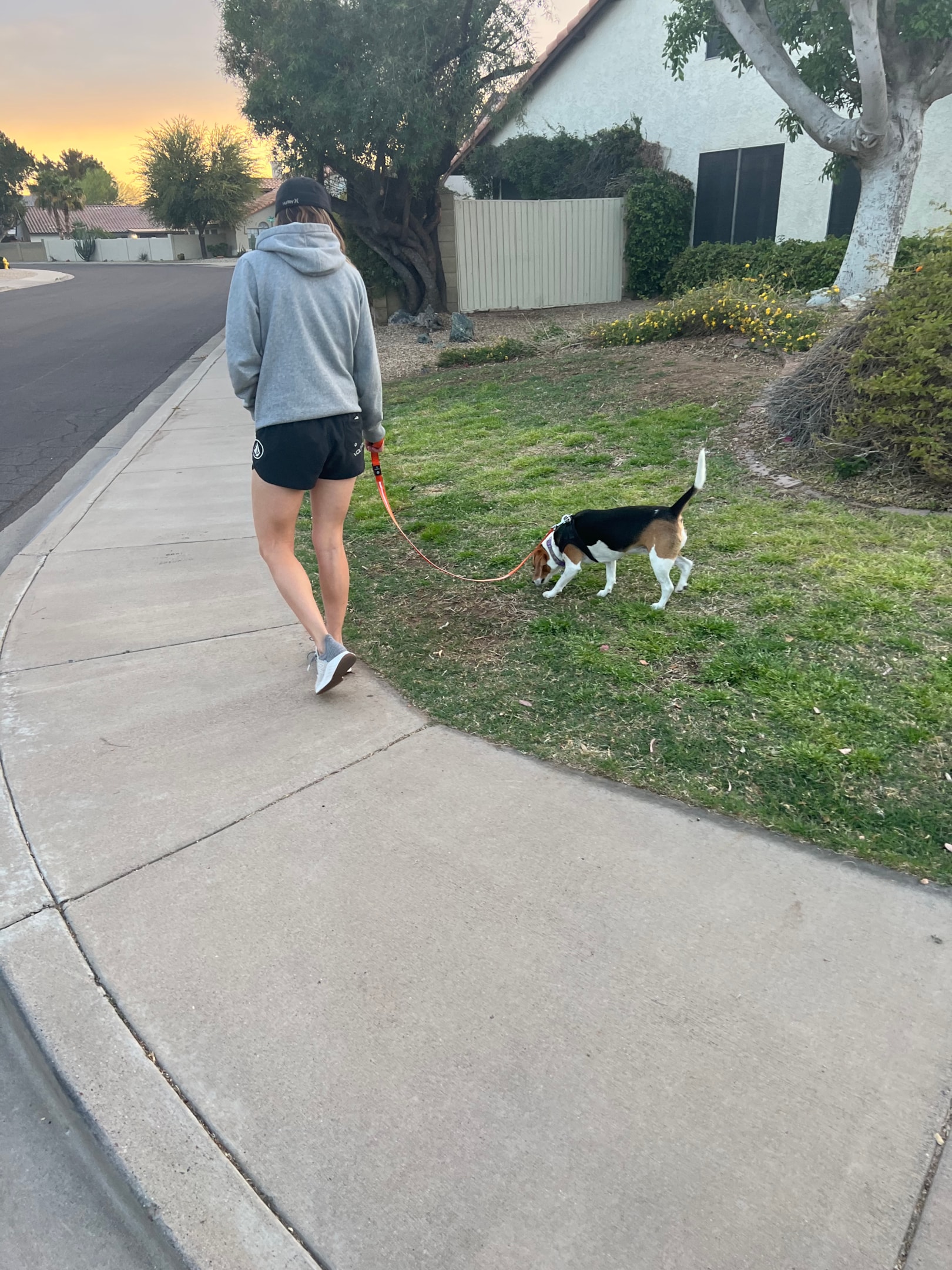Curious about Beagle sleep patterns? Beagles can spend a significant portion of the day sleeping, which is an unusual habit for dogs. Beagles need plenty of rest to stay healthy and happy. This guide covers how much sleep Beagles need at different ages, why they sleep so much, and what influences their sleep.
Key Takeaways
- Beagle puppies require significant sleep—18-20 hours for pups and 12-14 hours for adult Beagles—to support their energy needs and overall health.
- A Beagle’s sleep quality is influenced by factors like age, activity levels, and their sleeping environment; regular exercise and a calm, quiet place are essential.
- Establishing a consistent routine is crucial as dogs thrive on routine to maintain their overall well-being. Monitoring their sleep patterns can prevent behavioral issues and ensure your Beagle stays happy and well-rested.
Find out how to train your beagle to be the well-behaved pup you desire – Read Free Report
How Much Sleep Do Beagles Need?
Beagles are known for their boundless energy, but did you know that they also need a substantial amount of sleep to recharge? Beagle puppies need a lot of rest, often sleeping for 18 to 20 hours daily to support their rapid growth and development. This extensive sleep helps them build the strength and resilience they need as they grow into adult Beagles.
Adult Beagles usually need 12 to 14 hours of sleep daily, including nighttime sleep and daytime naps. These long rest periods are crucial for their overall health, helping them recover from high-energy activities and stay alert. Separation anxiety can disrupt their sleep patterns, so addressing this issue is essential to ensure they get adequate rest.
Why Do Beagles Sleep So Much?

Beagles sleep a lot because their active nature requires significant rest for recovery. After a day filled with play, walks, and exploration, a Beagle needs to recharge its batteries. Beagles often sleep more after active days or during quieter periods.
Beagles also follow natural sleep patterns that include multiple short naps throughout the day. This is a common trait among many dogs, especially hounds like Beagles. Beagles often engage in day sleeping as part of their natural sleep patterns, helping them recover from their active lifestyle. Boredom, inactivity, or a calm environment can also lead to increased sleep in Beagles.
Factors Influencing Beagle Sleep Patterns
Age, activity levels, and sleeping environment are key factors influencing Beagle sleep patterns. These elements significantly affect how much and how well your Beagle sleeps. Dogs thrive on a consistent routine, which helps regulate their sleep patterns and overall well-being.
Age
A Beagle’s sleep requirements change with age. Puppies, for example, often need up to 20 hours of sleep daily due to rapid growth. This extensive rest supports their development and energy needs for active play.
Older Beagles generally need more sleep to accommodate reduced energy levels and manage age-related health issues. They often engage in day sleeping to ensure they are properly rested and can maintain their health and well-being.
Activity Levels
Regular physical and mental activities help maintain healthy sleep patterns in Beagles. Daily walks and playtime expend their energy, leading to more restful sleep. Insufficient exercise can make Beagles restless and anxious, disrupting their sleep.
Balancing exercise is important; too little can cause restlessness, while too much right before bedtime might keep them awake. A balanced routine with sufficient daytime play ensures sound sleep at night. Dogs thrive on a balanced routine, which helps them get enough rest and maintain healthy sleep patterns.
Environment
The sleeping environment greatly affects nighttime sleep quality. Excessive light and noise can disrupt their rest. A calm, distraction-free sleeping area is essential for good rest.
Beagles thrive in environments with minimal disturbances and a sense of security. Setting up a designated sleeping area that minimizes noise and light can significantly improve sleep quality.
Beagle Sleep Habits
Understanding Normal Sleep Behaviors
Beagles, like all dogs, have unique sleep habits influenced by their breed, age, and individual characteristics. Understanding these normal sleep behaviors can help you ensure your furry friend gets the restful sleep they need.
Beagles are known for their active nature, which means they require a significant amount of sleep to recover from their daily activities. On average, a Beagle sleeps for 12-14 hours a day, including both nighttime sleep and daytime naps. This extensive rest is crucial for their overall health and well-being.
Beagle puppies, in particular, need a lot of sleep to support their rapid growth and development. These little bundles of energy can sleep up to 18-20 hours a day, with frequent naps throughout the day. This sleep helps them build the strength and resilience they need as they grow.
Adult Beagles tend to sleep more soundly at night but still need regular daytime naps to recharge. Their sleep patterns are influenced by their activity levels, with more active days leading to deeper, more restful sleep.
Older dogs, on the other hand, may sleep more during the day due to reduced energy levels and age-related health issues. It’s important to monitor their sleep patterns and ensure they have a comfortable and quiet place to rest.
Common Sleeping Positions and What They Mean
Beagles, like all dogs, have unique sleeping positions that can reveal their comfort level, mood, and even health. Here are some common sleeping positions and what they mean:
- Curled up in a ball: This is a common sleeping position for Beagles, indicating they feel safe and comfortable in their environment. When a Beagle sleeps curled up, it often means they are conserving body heat and protecting their vital organs.
- Stretched out on their side: This position suggests your Beagle is feeling relaxed and content, with their legs stretched out to the side. It indicates they are comfortable and trust their surroundings.
- On their back with paws in the air: This position can indicate your Beagle is feeling hot or uncomfortable, as they are trying to cool down by exposing their belly. It also shows they feel secure and safe in their environment.
- Tucked away in a corner: This position may suggest your Beagle is feeling anxious or stressed, as they are trying to hide away from their surroundings. It’s important to provide a comfortable and quiet place for them to rest and feel secure.
By understanding these common sleeping positions, you can better recognize your Beagle’s needs and provide them with a comfortable and quiet place to rest. This will help ensure they get the restful sleep they need to thrive.
Recognizing Sleep Disorders in Beagles
Sleep disorders can affect Beagles just like they do humans. Common issues include sleep apnea, which causes breathing interruptions, and insomnia, often due to stress or discomfort. Look for symptoms like loud snoring, frequent waking, and excessive daytime sleepiness.
Significant changes in sleep duration or quality might indicate an underlying health issue. Persistent sleep problems warrant a veterinary visit for proper care and treatment.
The Role of Exercise in Beagle Sleep

Exercise is crucial for promoting better sleep in Beagles. High levels of physical activity help expend energy, leading to deeper, more restful sleep. Regular exercise tires them out physically and stimulates them mentally, promoting healthy sleep patterns.
Daily walks, playtime, and scent games are essential for tiring out a Beagle and ensuring better sleep. Adequate exercise can prevent restlessness and anxiety, paving the way for sound sleep at night.
Creating a Comfortable Sleeping Area
A comfortable sleeping area is essential for a Beagle’s rest. When a dog sleeps, they need a stable, familiar environment with minimal noise and light disturbances.
Creating such an area involves choosing the right bedding, location, and maintaining proper temperature control.
Bedding
The right bedding promotes better sleep in both Beagle puppies and adults. Soft, supportive bedding ensures puppies feel secure and comfortable. Older Beagles benefit from memory foam beds, offering superior comfort and support, especially for joint issues.
Durable materials like nylon and canvas resist chewing and tearing. Removable, machine-washable covers make maintaining hygiene and comfort easy. Check out our shop for a selection of high-quality Beagle beds and other essential supplies!
Location
A quiet, low-traffic spot in the home is ideal for a Beagle’s sleeping area, away from distractions. This setup ensures rest without interruptions from household activities and noise. A calm, designated sleeping spot enhances their sleep quality.
A comfortable and quiet place helps your Beagle relax and sleep soundly, contributing to overall well-being.
Temperature Control
Optimal temperature is key to a Beagle’s sleep quality. Beagles sleep best in moderate temperatures, ideally between 65°F and 75°F. Extreme temperatures can disrupt their sleep, so keeping their sleeping area comfortable year-round is important.
Temperature regulation keeps your Beagle comfortable, ensuring restful sleep. Heating in winter and cooling in summer help maintain a consistent, comfortable temperature.
The Impact of Diet on Beagle Sleep

A balanced diet significantly influences a Beagle’s sleep quality. High-quality proteins, fats, and carbohydrates support overall health and better sleep. Meal timing is important; feeding too close to bedtime can cause discomfort and disrupt sleep.
A balanced diet at appropriate times maintains energy levels and supports restful sleep. Avoid feeding right before bedtime to prevent sleep disturbances and ensure sound sleep.
Establishing a Consistent Sleep Routine
A consistent sleep routine is vital for regulating sleep patterns and reducing stress. A regular schedule with physical activity helps train Beagles to sleep at night. Quiet evening activities, like a gentle walk or petting, signal it’s time to wind down.
A consistent routine with ample exercise and engagement ensures better sleep and emotional stability. A structured schedule promotes better sleep and overall well-being.
Common Behavioral Issues Related to Sleep
Sleep deprivation can cause behavioral issues in Beagles, such as irritability, anxiety, and hyperactivity. Inadequate sleep increases susceptibility to anxiety disorders and aggressive behaviors. Separation anxiety can exacerbate other behavioral problems and should be addressed to ensure Beagles get adequate rest.
A consistent sleep routine and comfortable environment help mitigate these issues. Adequate exercise and a structured schedule prevent sleep-related behavioral problems, ensuring a happy, well-rested Beagle.
Monitoring Your Beagle's Sleep Patterns
Monitoring sleep patterns ensures your Beagle gets enough rest and helps identify potential issues. Signs of sleep problems include sleeping more than usual or trouble settling down. Tracking sleep habits helps recognize unusual changes and take timely action.
Consult a veterinarian if you notice persistent changes in sleep patterns. Age, exercise, and environment influence sleep, making it crucial to monitor and adjust as needed.
Summary
Understanding and managing Beagle sleep is essential for their overall health and happiness. From knowing how much sleep they need to creating a comfortable sleeping environment, every detail counts. Regular exercise, a balanced diet, and a consistent routine are key components of promoting healthy sleep patterns.
By following these best practices, you can ensure your Beagle gets the restful sleep they need to thrive. Remember, a well-rested Beagle is a happy and healthy companion, ready to share many joyful moments with you.
Frequently Asked Questions
How much sleep do Beagle puppies need?
Beagle puppies need a lot of sleep, around 18-20 hours a day, to help them grow strong and healthy. It's essential to let them rest as much as they need!
Why do Beagles sleep so much?
Beagles sleep a lot because they have an active lifestyle and need plenty of rest to recharge after their energetic activities. It's all part of keeping them healthy and happy!
What are common sleep disorders in Beagles?
Beagles often suffer from sleep apnea and insomnia, leading to loud snoring and frequent waking. Addressing these issues can help improve your furry friend's sleep quality.
How can I create a comfortable sleeping area for my Beagle?
To create a comfortable sleeping area for your Beagle, make sure it's quiet and free of disturbances with supportive bedding and a cozy temperature. Your furry friend will appreciate a restful space!
What role does diet play in Beagle sleep?
Diet plays a crucial role in your Beagle's sleep quality; a balanced diet promotes better overall health and restful nights.
Learn how to train your beagle to be the well-behaved dog you desire –> Access our Free Report
Shop for beagle-themed products and gifts that beagle enthusiasts will love.

